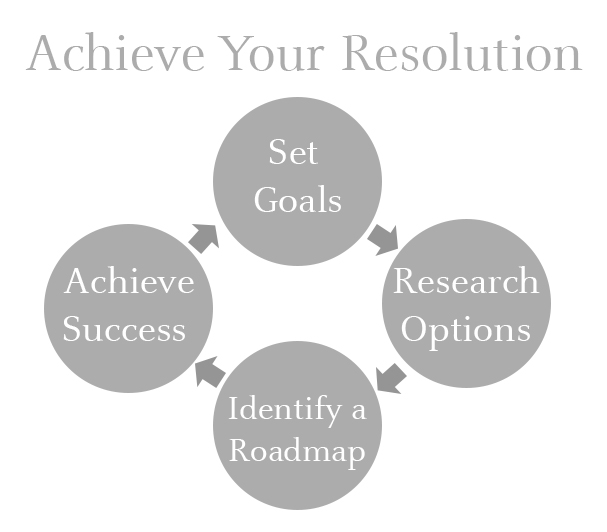It’s an exciting time of year! Everywhere you turn, people are buzzing about their New Year’s resolutions, and the positive changes they’re planning for a bigger, better 2018. Working out on a regular basis. Cutting the budget so you can afford your dream vacation. Taking more ‘me’ time.
Whatever your goals, wishes or dreams are, it’s a time to hit the ‘restart’ button. The options are endless for a new story in 2018.
So what if your new story involves getting a divorce? More than likely, this isn’t an idea that has just popped up since New Year’s; it’s likely something you have been agonizing over for months now. As with any resolution, you need a plan to succeed. You need to articulate the resolution, set specific goals, research and identify a roadmap, and achieve your end goal.
If divorce is part of your 2018 self-improvement plan, this step-by-step guide will help you reach your goal.
Goals
As with any resolution, you need to identify your specific goals. Perhaps your goals involve:
- settling your divorce case outside of court with the least amount of hostility possible
- protecting your children’s well-being and adjustment, and
- ensuring that your financial needs are met
Your goals can be as broad or narrow as you would like, but should be prioritized and realistic. A goal that involves the downfall of your spouse is not usually productive, and should be avoided.
If you are not sure how the divorce process goes, or what your options are, you may want to do some research first to assist with generating your goals.
Research
While the internet contains a wealth of information, not everything is accurate. The research phase is a good time to consult with an experienced attorney to discuss your goals and understand your legal options. Things to consider in this phase include:
- What procedure will you and your spouse choose to obtain a divorce?
- Are you going to push your case through the court system, or are you and your spouse committed to settling your case outside of court?
- Are mediation or collaboration better options to achieving your specific goals?
It’s essential that you understand the pros and cons of each process to finalize your divorce in order for you and your spouse to make the best decision for your family.
You will also want to research general information about your divorce, custody and support case:
- What does a judge consider when dividing up the assets and debts?
- What are your options for custody?
- How much support can you get?
These are all questions you should be asking to educate yourself on the process. Again, a skilled attorney is your best resource to answer these questions.
Develop a Roadmap
Once you and your spouse have chosen the process for your divorce, you and your attorney can develop a roadmap to achieve your goal. These steps may include gathering financial documents to evaluate the assets and debts that will be divided through the divorce, sending proposals back and forth to reach a settlement, or meeting together with the attorneys to negotiate a settlement. Your roadmap will help guide you to reach your goal of finalization.
End Goal
It is important to remember that, throughout the process, adjustments will be made to the roadmap, but if you want to stick to your goals, you need to work sensibly with your attorney. Reflect on what is most important to you, and remember that this isn’t about winning. The reality is that no one wins in a divorce scenario. Hopefully the end result will protect the children and put both spouses in a place where they can move forward and be financially self-sufficient.
For more information on your options, contact Dorothy Wolbert at dcwolbert@burnswhite.com or
412-995-3107.
